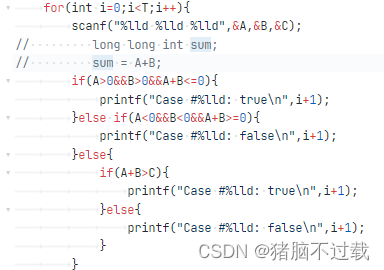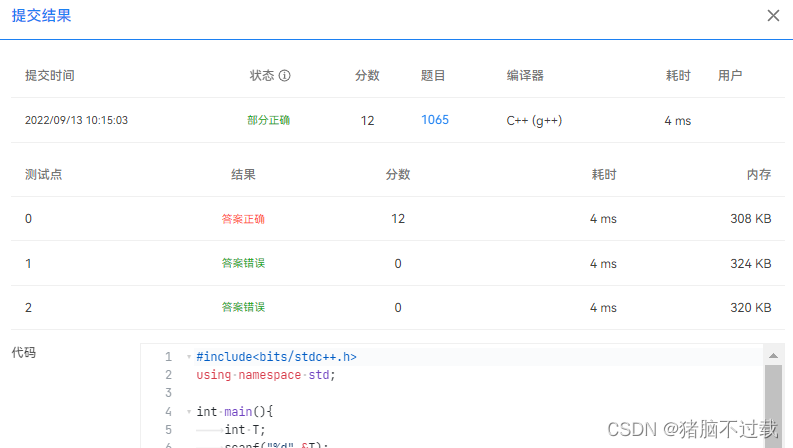Given three integers?A,?B?and?C?in (?,
), you are supposed to tell whether?A+B>C.
Input Specification:
The first line of the input gives the positive number of test cases,?T?(≤10). Then?T?test cases follow, each consists of a single line containing three integers?A,?B?and?C, separated by single spaces.
Output Specification:
For each test case, output in one line?Case #X: true?if?A+B>C, or?Case #X: false?otherwise, where?X?is the case number (starting from 1). Each line should ends with?'\n'.
Sample Input:
3
1 2 3
2 3 4
9223372036854775807 -9223372036854775808 0
Sample Output:
Case #1: false
Case #2: true
Case #3: false
解题思路:
给出的数字在? (?,
)的范围内,也就是long long int 的范围内,那么两个long long int 相加如果正数变成负数,说明溢出,也就是肯定大于第三个数;如果两个负数相加,变成正数,那么就是负溢出,肯定小于第三个数。
易错点:
代码大家应该都能按照这个思路敲出来,但是有个小bug,例如你用pat上的C++(g++)的编译器时:

如果你不把注释掉的代码加上,那运行结果就会出错;
但如果你用的时C++(clang++)的编译器时,你就可以不用加上注释掉的那行代码。
本质原因应该是因为如果你不定义和的类型的话,有些编译器会把long long int类型数字相加默认变成long int 类型的相加,就会导致结果出错。?
同一段代码:
????????这是C++(g++)编译器的运行结果:

? ? ? ? 这是C++(clang++)的运行结果:

代码:??
#include<bits/stdc++.h>
using namespace std;
int main(){
int T;
scanf("%d",&T);
long long int A,B,C;
for(int i=0;i<T;i++){
scanf("%lld %lld %lld",&A,&B,&C);
// long long int sum;
// sum = A+B;
if(A>0&&B>0&&A+B<=0){
printf("Case #%lld: true\n",i+1);
}else if(A<0&&B<0&&A+B>=0){
printf("Case #%lld: false\n",i+1);
}else{
if(A+B>C){
printf("Case #%lld: true\n",i+1);
}else{
printf("Case #%lld: false\n",i+1);
}
}
}
return 0;
}